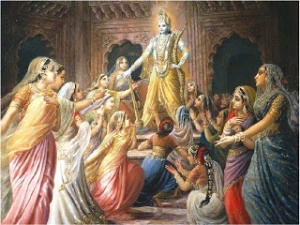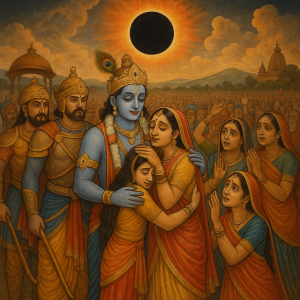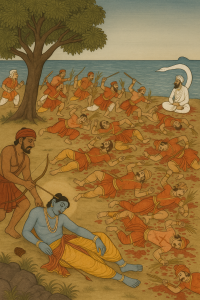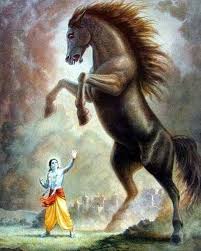The Demon Narakāsura’s Abduction of Princesses
Far from Dvārakā, in the region of Prāgjyotiṣapura, there reigned a powerful and wicked asura named Narakāsura (also called Bhauma). He was the son of Bhūmi-devī (Mother Earth), but he had become corrupted by ego, lust, and conquest.
He rampaged across the earth and the heavens, conquering celestial regions, stealing the earrings of Aditi (the mother of the devas), capturing a portion of Indra’s kingdom, and abducting 16,100 royal princesses from various kingdoms. These innocent girls were imprisoned in his harem like helpless birds in a cage.
No one dared to oppose him.
The Devatās Appeal to Kṛṣṇa
The demigods, unable to tolerate the growing tyranny, approached Lord Kṛṣṇa, the Supreme Protector of dharma.
“O Madhusūdana,” they prayed, “Narakāsura has defiled our honor, abducted countless daughters of kings, and brought pain to the three worlds. Only You can stop him.”
Hearing their plea, Kṛṣṇa mounted His divine chariot with Queen Satyabhāmā, who insisted on accompanying Him. She was eager to witness the fall of the wicked.
The War at Prāgjyotiṣapura
Narakāsura had fortified his kingdom with mystical barriers—mountains of iron, fiery moats, and a fortress guarded by deadly beasts and armies of asuras. But Kṛṣṇa, with His Sudarśana Cakra and divine arrows, cut through all defenses like a lion tearing through bamboo.
Kṛṣṇa killed Mura, Naraka’s general, with His gada (mace), and then entered the heart of the palace.
There, Narakāsura, proud and fierce, rushed to battle, hurling fiery spears and demon missiles. But Kṛṣṇa, with calm might, cut off his weapons, pierced his armor, and finally struck off his head with the Sudarśana Cakra.
With Naraka’s fall, the earth sighed in relief, and all the devas showered flowers from the heavens.
The Cry of the Captive Princesses
Kṛṣṇa then entered Naraka’s palace and found the 16,100 princesses, imprisoned behind golden bars. Upon seeing Him, their eyes filled with tears.
“O Lord! We have been stolen from our families, dishonored by captivity, and now no one will accept us. If You do not take us as Your own, we shall perish in shame and sorrow!”
Their words were simple, yet filled with sincere surrender. They desired not marriage for status, but to become His servants, His devotees, and His eternal consorts.
Kṛṣṇa Accepts Them All
Kṛṣṇa smiled with infinite compassion.
“You are all My wives from this day forward.”
By His divine potency, He expanded Himself into 16,100 forms and simultaneously accepted each princess in a separate ceremony. The marriages were celebrated in royal joy when they all returned to Dvārakā.
Thereafter, Kṛṣṇa built palaces for each one, gave them love, dignity, and spiritual fulfillment. Though He had so many queens, His attention and affection to each was personal and perfect, as if He lived only for her.
Lessons to Be Learned:
- The Lord comes to rescue the innocent, especially those wronged by tyrants and rejected by society.
- Kṛṣṇa accepts those who surrender to Him fully, regardless of their past.
- The soul may feel fallen and dishonored, but Kṛṣṇa redeems all with His love.
- Kṛṣṇa is not bound by material rules—He can be with countless devotees, and still give each one full affection.
- The marriage with the 16,100 princesses represents the Lord’s eternal relationship with all individual souls, each unique, personal, and cherished.
Origin of the Story: Harivaṁśa Purāṇa – Viṣṇu-parva, Chapters 99–103
Would you like to continue with Story 34: The Killing of Śālva and the Destruction of the Flying City?



